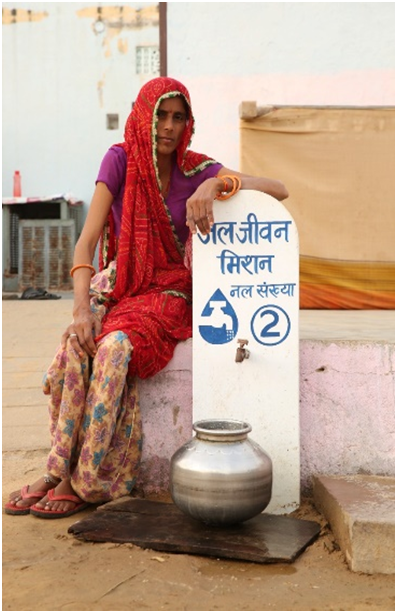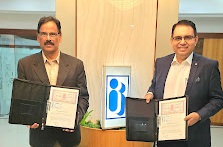He reminded that, “When Jal Jeevan Mission
was launched by the Prime Minister on 15th August 2019, only 16.75%
of rural households had access to tap water connections. Despite disruptions
caused by the pandemic in the last 2½ years, we have managed to provide more
than 6.16 Crore tap water connections and about 9.40 Crore (49%) of households
in the villages are benefitting from clean drinking water”.
He further added, “The nation takes pride
by saying that all districts in India declared themselves open defecation free
(ODF) on 2nd October 2019, much ahead of the target deadline set
under Sustainable Development Goal (SDG – 6). Sujlam 2.0 campaign has been
launched with the objective to manage greywater through people’s participation.
Under the campaign, we plan to mobilize communities, institutions like
panchayats, schools, anganwadi to undertake greywater management. Greywater can
be best managed where it is generated and turns into a major management and
infrastructure challenge, if it is allowed to accumulate and stagnate. Our PRIs
would work with people to ensure that greywater is managed at the most
appropriate local level through construction of household and community
soakpits.”
Dr. Mahesh Joshi, Minister of Ground
Water, Government of Rajasthan was present for the conference representing the
host State, and was attended Shri Arjun Singh Chauhan, Minister of Rural
Development and Shri Brijeshkumar Merja, MoS Rural Development from Gujarat.
From Haryana Dr. Banwari Lal, Minister of Cooperation & Welfare of SCBCs
and Shri Devendra Singh Babli, Minister of Development and Panchayat; from
Maharashtra, Shri Gulabrao Patil, Minister of Water Supply and Sanitation, and
Shri Sanjay Bansode, MoS for Environment & Climate Change, Water Supply and
Sanitation, Public Works, Employment Guarantee, Parliamentary Affairs; and from
Punjab, Shri Brahm Shankar Sharma, Minister for Revenue and Water Resources
along with senior officers from the participating States/ UTs. All States’
Ministers actively participated in the deliberation and elaborated on their
plan to become ‘Har Ghar Jal’ as well as measures for long-term
sustainability of water supply schemes.
Secretary, DDWS, Smt. Vini Mahajan, in her
opening remarks reiterated the importance of time-bound completion duly
ensuring ‘no one is left out’ from getting the service. She emphasized the JJM
motto of ‘building partnerships, working together’ mentioning ways of
collaboration between different stakeholders, viz. local community, ISAs, SHGs,
NGOs/ VOs/ CSOs, State/ National/ International organizations. Regarding the
pace of work, she urged the States to expedite tendering process, engage human
resources to have adequate staff and support institutions such as SPMUs/ DPMUs,
Third Party Inspection Agencies (TPIAs) to check quality of materials and work,
etc. so that the planning/ review time becomes more efficient. Given that most
of the participating States are water-stressed, she advocated for convergence
between departments to promote collective work towards strengthening water
source sustainability and finally, requested the States to consider promoting
water user charges from households as a step towards valuing water.
Reaffirming its commitment towards public
health and well-being of the people living in rural areas, in the Union Budget
2022, fund allocation for JJM has increased from Rs. 45,000 Crore in 2021-22 to
Rs. 60,000 Crore in 2022-23. For SBM(G),
Rs. 7,192 Crore has been allocated in the budget for the year 2022-23.
For the year 2022-23 under JJM, Rs 32,609
Crore has been tentatively allocated by the Centre for these 8 States and 2
UTs. (Goa – Rs 48 Crore, Gujarat – Rs 3,452 Crore, Haryana – Rs 1,099 Crore,
Himachal Pradesh – Rs 1,280 Crore, Maharashtra – Rs 7,415 Crore, Punjab – Rs
1,693 Crore, Rajasthan – Rs 11,752 Crore, Uttarakhand – Rs 1,502 Crore, Jammu
& Kashmir – Rs 2,875 Crore and Ladakh – Rs 1,493 Crore). Under SBM(G), Rs 2167 Crore has been
tentatively allocated for the said States. (Goa – Rs 29 Crore, Gujarat – Rs 206
Crore, Haryana – Rs 224 Crore, Himachal Pradesh – Rs 152 Crore, Maharashtra –
Rs 786 Crore, Punjab – Rs 82 Crore, Rajasthan – Rs 365 Crore, Uttarakhand – Rs
65 Crore, D&NH – Rs 5 Crore, Jammu & Kashmir – Rs 243 Crore and Ladakh
– Rs 11 Crore).
In addition, under 15th Finance
Commission a total of Rs. 27,908 Crore is allocated for Rural Local Bodies/
Panchayati Raj Institutions (RLBs/ PRIs) for the year 2022-23. There is an
assured allocation of Rs. 1.42 lakh Crore for next five-years i.e. upto
2025-26. For the participating States, Rs. 7,632 Crore is allocated as a tied
grant to carry out water and sanitation related activities for the year
2022-23.
Financial status
|
State/ UT |
In 2021-22 |
2022-23 |
|
|
Allocation |
Fund drawn by State/ UT |
Tentative allocation |
|
|
Goa |
46 |
23 |
48 |
|
Gujarat |
3,411 |
2,558 |
3,452 |
|
Haryana |
1,120 |
560 |
1,099 |
|
Himachal Pr. |
1,263 |
2,013 |
1,280 |
|
J & K |
2,747 |
604 |
2,875 |
|
Ladakh |
1,430 |
341 |
1,493 |
|
Maharashtra |
7,064 |
1,667 |
7,415 |
|
Punjab |
1,656 |
402 |
1,693 |
|
Rajasthan |
10,181 |
2,345 |
11,752 |
|
Uttarakhand |
1,444 |
1,083 |
1,502 |
|
Total |
30,361 |
11,595 |
32,608 |
SBM(G) Phase-II was approved in February,
2020 with a total outlay of Rs 1,40,881 Crore to focus on sustainability of ODF
status and Solid and Liquid Waste Management (SLWM). It is a novel model of
convergence between different verticals of financing under various Central and
State governments. Apart from budgetary allocations by Department of Drinking
Water and Sanitation (DDWS) and corresponding State share, remaining funds are
being dovetailed from 15th Finance Commission tied-grants to Rural Local Bodies,
MGNREGS, CSR funds and revenue generation models, etc., particularly for Solid
and Liquid Waste Management (SLWM).
Phase II of SBM(G) has seen a solid start
with nearly 69 lakh household benefitting from Individual Household Latrines
(IHHL). Over 1.28 lakh Community toilets were built and more than 56,000
villages declared themselves ODF Plus in the country. Over 63,000 villages have
already been covered with solid waste management (SWM) arrangements and over
39,000 villages have achieved liquid waste management (LWM) arrangements. In the participating States, number of IHHLs
and Community Sanitary Complexes (CSCs) constructed during SBM-G Phase II is
over 14 lakhs and over 22,000 respectively and over 12,000 villages were
declared as ODF Plus.
Post lunch, subject matter experts and
senior government officials held technical sessions on quality of works, pace
of implementation, software activities such as training/ skilling/ capacity
building programmes, water quality monitoring and surveillance, use of technology,
source sustainability and greywater management. Experts from development sector
shared their learnings with the officials present. Thereafter, breakout
sessions were held with States/ UTs to discuss State specific issues and
challenges.






